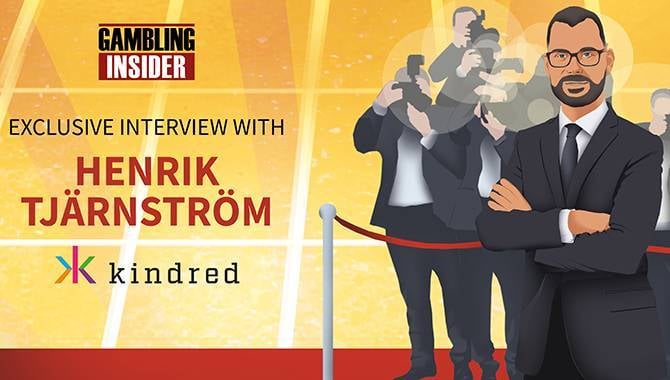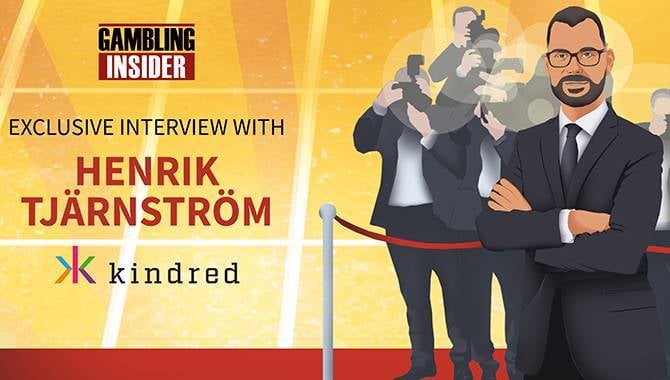
Did you ever hear about the 10-year-old who won the Swedish lottery?
Henrik Tjärnström gives Gambling Insider the ‘exclusive’ story: “I was 10-years-old in 1980 and I actually won SEK 6,500 ($684), which was quite a lot of money for a 10-year-old at that time. My mother invested it in bonds and I got some pocket money to buy a new pair of skates and some sports gear.”
Of course, there were far more influential factors behind Tjärnström’s road to becoming Kindred Group CEO. But it’s certainly a fun anecdote for the executive to recount as we begin our feature-length interview. “In Sweden, we have a strict 18-year-old policy now, which is enforced quite strongly at the lottery outlets,” he says. “But back in those days, kids could bet about 50p ($0.65) and get five rows, and I won the equivalent of around £600. We lived in the countryside and when the postman came round, he thought my father had won the lottery. My grandmother said: ‘No, it’s Henrik who’s won!’”
As we venture back to the Kindred CEO’s childhood, it’s unsurprising to hear about a young boy’s dream of becoming a footballer. Tjärnström laughs when describing the stark realisation “that’s probably not going to happen” and there is no sense of regret in his choice of “accepting reality and looking for a normal job.”
Tjärnström’s father worked in construction, setting the tone for his son to follow the same path. A four-year technical high school education led to engineering work at Skanska – a Swedish construction company – in 1990, when the Swede was 20. Six years at Skanska followed, before Tjärnström undertook a master’s in engineering and management between 1996 and 2000.
Rejoining Skanska in 2003, he moved to London to work on several Royal London Hospital projects. It was also then that Tjärnström joined the board of Unibet (which later became Kindred) as a non-executive director until 2008. The Kindred CEO says he always held an interest in gaming, which was a significant part of Swedish culture as he grew up. That early lottery win might have helped too.
After five years on the Unibet board, Tjärnström was allowed to truly develop his passion for gaming when asked to become interim CFO. “Petter Nylander, who was CEO, was happy with what I was doing. I enjoyed it very much and the board was happy as well, so I got made CFO permanently for two-and-a-half years,” Tjärnström recalls. “In the middle of 2010, when Petter moved back to Sweden, I took over as CEO and have remained since. I’ve seen the company grow through different stages of development. I really enjoy what we’re doing and we have a fantastic team of people who all work well together.”
We knew it would be controversial to some extent. We’re very proud of what we do with Derby County, and how through that partnership we raise awareness about men’s mental health and work with the local community
The fact Tjärnström has held his role for just short of 10 years is not insignificant. Many CEOs have come and gone in that time and few in the industry have held such a high-level position for so long. Asked by Gambling Insider what it takes to show such staying power, Tjärnström gives an intriguing response. The Swede prioritises being “a bit paranoid,” even if Kindred is performing well. In the short term, he says, things can always fluctuate; but Tjärnström emphasises having a clear long-term plan and believing in it.
For Kindred, that plan has involved transforming the business from .com to .country, adopting a localised approach. “We thought regulation in Europe would go much faster than it has done; we anticipated back in 2010 it could be done and dusted by 2015,” he explains. “Now, we’re standing here in 2019 and we have 57% coming from locally-regulated markets, so we still have a bit more than 40% to go. We’ve been on the move towards that from 2010, looking at terms and conditions, costs and how we prepare our company. This proves things take longer than people think.”
When it comes to regulated markets, there is no avoiding the words “Sweden,” “channelisation” and “re-regulation.” Tjärnström admits Kindred did not foresee “so much leakage out of the system” and Sweden’s impact on the operator’s financial results since re-regulating on 1 January 2019 has been notable. Revenue dropped 2% year-on-year for Q3 2019, to £226m ($290m), with year-to-date revenue only up 3% to £676.7m.
EBITDA fell 33% for Q3 (to £37.2m) and 32% for the year-to-date (to £98.3m). Kindred’s Q3 profit before tax amounted to £21.4m, a fall of 49%, while the operator generated profit after tax of £18.1m, a 51% decrease. These results have unsurprisingly coincided with a fall in Kindred’s share price, from SEK 82.32 at the start of the year to SEK 57.12 at the time of writing.
“We and most of our competitors anticipated a phase of increased growth,” Tjärnström says. “It seems to instead be a rather significant decrease from the regulated operators’ point of view, which is a disappointment. I didn’t think people would be as opportunistic and aggressive as they have been. We know the black market is just one click away, but it’s as open as Googling Spelpaus, which is the self-exclusion register, and the top link you get is ‘gamble on a Swedish casino without a license.’ That’s how readily available those kind of sites are.”
Here is where Tjärnström stresses that key word: “channelisation.” Channelisation measures what percentage of a market consists of official, regulated operators. If heard too often, it can sound more like a meaningless cliché than anything, especially as use of the term has become more common in recent months. But, as the Kindred CEO points out, “the only way to measure the success of a regulated market is by measuring that market’s channelisation.”
Tjärnström warns: “It’s a mistake in the system that there are just B2C licenses. We have been asking for B2B licenses to be added to the current system. Without them, regulators have limited tools to actually go after the black market. Channelisation was 100% in January and is already, officially, around 85%. Using unofficial numbers, when I speak to peers in the industry, channelisation is already as low as 60% to 70%, especially in the casino sector. That’s a worry for the future and politicians and regulators have already started to appreciate the situation; we hope they act before it’s too late.”
On that note, the Swede takes a moment to reference recent recommendations from the Gambling Related Harm All-Party Parliamentary Group in Great Britain. He is one of many to argue its suggested £2 online slot stake limit will significantly harm the British market’s channelisation, which is currently around 90% to 95%, according to the CEO. But, on a broader note, Tjärnström believes “one has to be very careful about making any adjustments in an online world. As you see in Sweden, the alternative is just one click away. I think it’s so important to stress that if you get channelisation above 90%, it’s a win-win for everyone in society.”
Apart from generating tax revenue, creating reinvestment into sports and providing operators with more stable projections of future performance, the main aim in curbing the black market is to keep players safe. Responsible gambling, as such, is at the heart of Kindred’s corporate messaging in presentations to regulators, competitors and investors alike; so much so, the operator aims to achieve 0% revenue from problem gambling by 2023. Despite that target though, and despite winning a Global Gaming Award for its responsible gambling software in 2019, Kindred attracted heavy criticism for an episode involving former England footballer Wayne Rooney last August.
When English Championship football club Derby County, sponsored by Kindred-owned online casino 32Red, announced it will sign Rooney in January, eyebrows were raised in the footballing world. When it was revealed Rooney would wear the number 32 on his shirt as part of 32Red’s sponsorship, there was sheer outrage from certain sectors. Chief among the critics was GVC CEO Kenny Alexander, who labelled the move a “complete own goal.”
“We knew it would be controversial to some extent,” Tjärnström begins. “We see it in a bigger perspective. We’re very proud of what we do with Derby County, and how through that partnership we raise awareness about men’s mental health and work with the local community. We think shirt sponsorships can be used for good and don’t just have to be seen as a reason for excessive gambling. I believe we as an industry have a role to play in that; as long as we ensure customers gamble with moderation.”
With the new technologies and tools available for us, we don’t see it as unreasonable to assume we can all but eradicate problem gambling as we see it today. The important thing is to make it happen in an open and transparent environment
That brings Tjärnström to Kindred’s 0% target. The company doesn’t want customers who play with more than they can afford to lose. Taking responsibility, the CEO says, is a “fundamental aspect” of long-term profitability. But, given the nature of both the industry and its product, is eliminating all problem gambling revenue by 2023 truly realistic for Kindred?
“Of course, it comes down to definition as well: what’s harmful gambling and what’s not,” Tjärnström concedes. “We have our own definition internally on our systems we work with, which we are confident in. Of course, others from the outside can say they are biased – we appreciate that. But we are being more and more transparent on our targets and what we do.
“We, together as an industry, need to fend off the black market. That’s probably more of a problem, where you have smaller operators who are difficult for the regulator to get in contact with; they can go under the radar to a larger extent and they still destroy a lot for us larger operators. There, we need to work together with regulators and other operators, to create a sound market for the players and ensure it’s an entertainment experience rather than anything else.”
In highlighting the entertainment aspect of gaming, the Kindred CEO echoes the thoughts of another interviewee in this issue: Evolution Gaming’s Martin Carlesund. According to both, the likes of Spotify, Netflix and HBO are primary competitors for gaming brands. In Tjärnström’s eyes, gaming must strive to be part of the “customer’s entertainment budget,” building a lifelong relationship and making customers want to come back. In other words, there’s no point fleecing them for everything they have so they never return.
“With the new technologies and tools available for us, we don’t see it as unreasonable to assume we can all but eradicate problem gambling as we see it today,” Tjärnström says. “People have gambled for thousands of years – that’s not going to go away; the important thing is to make it happen in an open and transparent environment. We can take care of customers and stop the problem before it arises.”
As we draw towards the end of our interview, this is one of several aims the CEO highlights. Another addresses the “major opportunity” of the US market, where Unibet has signed partnerships with the NBA, New Jersey Devils, Philadelphia Eagles and more. Tjärnström is aware the European operator faces challenges in a very different jurisdiction, including the Unibet brand “coming from nothing” on that side of the Atlantic Ocean.
“That’s fundamental in the long term – a good balance between European digital expertise and local US expertise,” he says. “It will take some time to build recognition in New York and Pennsylvania. We will have trust through the partnerships we’ve built in Pennsylvania and New Jersey, as well as the other MLS partnerships we’ve signed. It helps to actually get the brand out there.
“We’re also being honest and saying the US is an investment case, especially in the first couple of years. We adjust as we go along for our long-term plan. It will be interesting to see the longer-term trends; it’s only basically the beginning in a number of states. It’s too early to tell some of the long-term numbers but, with some of the KPIs, the case is very optimistic.”
Tjärnström says the operator has grown at twice the speed of the overall market during his tenure so far, although Swedish re-regulation and recent headwinds from the Netherlands and Norway have been “a bit of a perfect storm.” But he concludes: “Fundamentally, we have every hope and reason to believe we’ll come out of this strongly and be back on growth relatively soon.”
Read the rest of the CEO Special below or click here to receive the print edition



